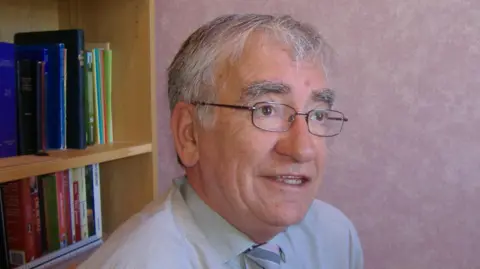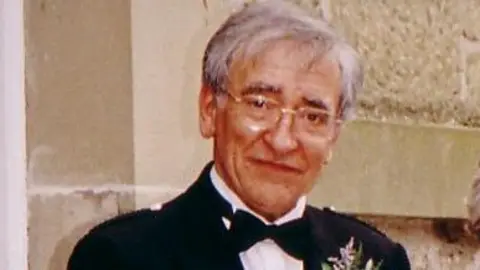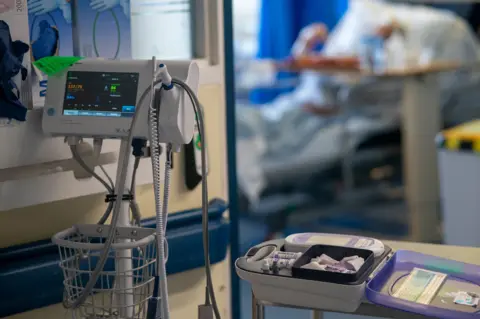David KnoxBBC Scotland News
 BBC
BBCNursing staff at a Scottish hospital have been criticised for leaving a dying man in “unnecessary pain” during his three months on their ward.
Roy Owen from Selkirk was admitted to Borders General Hospital (BGH) in Melrose for 24-hour palliative care in May 2023.
But the 79-year-old, who had prostate cancer which spread to his bone and spine, was repeatedly denied pain relief, while further pleas from his wife, Ann, were also ignored.
A lengthy investigation by the Scottish Public Services Ombudsman (SPSO) has identified “serious clinical failings… which led to a significant personal injustice to a vulnerable person”.
NHS Borders has been ordered to make a full apology to Mr Owen’s widow, as well as ensuring all staff are fully trained in pain management.

The SPSO probe found that Mr Owen was in pain for most of the 16 weeks he spent on a medical ward at the BGH.
On only two occasions during his entire time at the hospital did ward staff assess him as requiring additional pain relief to ease his distress.
It also discovered advice from consultants was ignored, there were lengthy gaps in pain assessments, and complaints from Mr Owen’s family were brushed under the carpet.
The SPSO’s damning report reveals that the ward had run out of pain relief medication, keys could not be accessed for opening the drug cabinet, and there were instances when Mr Owen took the wrong medication.
His widow said: “The reason my husband was at the hospital was for palliative pain management, so I find it odd that the attitude was so casual and certainly not adequate.
“When I went to visit him, he would be desperate for help – even after I went to tell the nurses, they would often do nothing, other times they would offer him paracetamol.
“A lot of our friends and family – many who were ex-NHS employees – came to visit Roy and they were appalled by what was going on. I knew things were bad, but the investigation report shows it was much worse at the hospital than any of us thought.”
 Jim Barton
Jim BartonMr Owen had moved to Selkirk more than 20 years earlier from Saffron Walden, where he ran his own timber and conservatory companies.
He quickly became an active member of the community, particularly with the town’s cricket club, the Roxburgh Singers and St John’s Church.
But in 2018 he was diagnosed with stage 4 prostate cancer, which had spread to his spine and lower limbs.
Despite more than four years of outpatient treatment at the Western General Hospital in Edinburgh and the local Macmillan centre in the Borders, Mr Owen’s cancer had continued to spread.
Consultants eventually referred the grandfather for palliative care, firstly at home – where he was prescribed heavy dosages of morphine by the local health centre – and then at Borders General Hospital from 15 May 2023.
He died at the hospital on 4 September that year.
The SPSO investigation into Mr Owen’s care and treatment at the region’s main hospital concluded: “(Mr Owen) was cognitively impaired and (his) pain was not adequately assessed or managed even though (he was) admitted for pain management arising from metastatic prostate cancer and had complex pain needs.
“This meant (Mr Owen) was left in unnecessary pain. Nursing staff did not follow specialist advice and instruction in managing (Mr Owen) and (his) pain.
“Documentation and record keeping was poor and fell below an acceptable standard.”
 PA Archive/PA Images
PA Archive/PA ImagesMrs Owen made attempts to complain about her husband’s treatment after his first week on the medical ward.
Despite putting her concerns in writing after meeting with nursing managers, she did not receive a response for more than six weeks.
And the response through more formal channels was similarly dismissive.
Mrs Owen said: “I had issues about Roy’s pain management from the start, and also his bed placement in the ward, which was next to the door, and he was regularly able to get out of bed and try to come home.
“I also had serious issues about the attitudes of two nurses in particular – but the responses I received were awful.
“It’s terrible seeing your husband in such pain, but it’s almost as bad having to deal with hospital management.”
The SPSO probe found that there were further failures by NHS Borders to “ensure the complaint response was accurate and substantiated by clinical records”.
The health authority has now been ordered to make an apology for the failings in its nursing care, treatment and complaint handling.
It will also have to provide evidence that all staff are competent in the use of pain assessment tools, that all patients will now receive person-centred care, and that advice from family members and specialists will be considered.
A spokesperson for NHS Borders said: “The quality of care that (Mr Owen) received was not of the standard we expect for our patients.
“We have accepted the recommendations identified in full and are making the changes required so that similar experiences are avoided in the future.
“We are sincerely sorry for the effect that this had on (Mr and Mrs Owen) and their family. We have offered a full apology to (Mrs Owen) and their family.”

